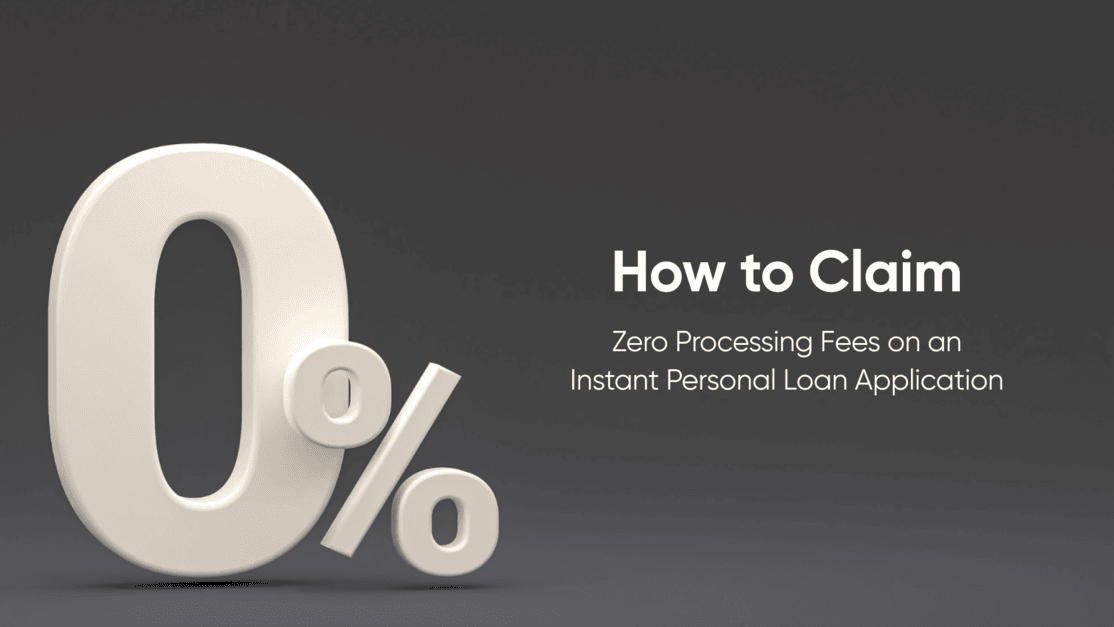Debt-To-Income Ratio And Personal Loans: Some Important Aspects You Must Be Aware Of

Table of Contents
ToggleWhat is Debt-to-Income Ratio?
The debt-to-income ratio (DTI) is a crucial financial benchmark that measures the proportion of an individual’s income that goes toward paying off debt. This ratio is essential in the world of finance, especially for those looking to manage their debts more effectively or seeking to secure personal loans.
Understanding and maintaining a favourable debt-to-income ratio is essential for anyone aiming to apply for a quick loan, even for a substantial amount like a 5 lakh personal loan. It significantly influences one’s financial health and capability to undertake new debts.
Calculating your DTI is straightforward – it involves dividing your total monthly debt payments by your gross monthly income, resulting in a percentage that represents your debt to income ratio. Lenders use this figure when evaluating loan applications. This can also affect the borrowing terms. A lower DTI ratio is often seen as the signifier of a borrower’s good financial health, indicating that they are less risky to lenders.
Relation Between Debt-to-Income Ratio and Personal Loan
Key Role in Loan Approval: The debt to income ratio is vital in assessing an applicant’s eligibility for personal loans, serving as a crucial indicator of their financial health and creditworthiness.
Impact on Loan Options: A favourable DTI ratio enhances an individual’s prospects to apply for quick loan options and get personal loan online. It is particularly beneficial for those seeking significant amounts, such as a 5 lakh personal loan or an unsecured personal loan.
Influence on Loan Terms: The importance of debt to income ratio also affects the terms of the loan. A lower DTI often results in more advantageous loan conditions, including reduced interest rates and flexible repayment schedules.
Debt Consolidation Benefits: For individuals aiming to streamline their finances through a debt consolidation loan, optimising their DTI is essential. A lower DTI not only improves the odds of loan approval but at the same time offers better financial products which can be beneficial to the borrower.
Importance of Debt-to-Income Ratio in Personal Loans
Understanding the what the debt to income ratio is critical when applying for personal loans in India. A low DTI ratio suggests that you manage your debts, making you a more appealing candidate for loans.
Significance in Loan Approval
Lenders heavily rely on the DTI to find out if borrowers can comfortably handle any additional financial obligations. A low DTI ratio (typically under 40%) increases your chances of securing a personal loan.
Impact on Loan Terms
A favourable DTI can lead to better loan terms. Lenders might offer lower interest rates or more flexible repayment plans to borrowers.
Essential for Debt Management
For those considering a debt consolidation loan, an optimal DTI ratio is crucial. It reflects your ability to manage a new loan effectively by consolidating existing debts, potentially leading to a single and more manageable monthly payment.
How Debt-to-Income Ratio Affects Personal Loan Eligibility
The debt to income ratio directly influences an individual’s ability to secure a personal loan. This ratio shows how much of a borrower’s monthly income goes toward paying off debt. Moreover, it can also help in understanding how much new debt an individual can comfortably handle, making it a critical factor in the loan approval process.
In practical terms, when individuals apply for a quick loan or wish to get a personal loan online, lenders review their DTI to ensure that new borrowing will not overburden their financial situation. For applicants aiming for a 5 lakh personal loan, a low DTI ratio could mean the difference between approval and rejection. It is equally crucial for those seeking debt consolidation loans or unsecured personal loans, as it reassures lenders of the applicant’s capacity for repayment without securing against an asset.
For personal loans, borrowers should strive to either increase their income or reduce existing debt, thereby improving their DTI ratio. This adjustment can significantly elevate their eligibility for personal loans, offering them the financial leverage they need while ensuring that their debt levels remain manageable.
Also Read: Secured vs. Unsecured Loan: What is the Difference?
Calculating Debt-to-Income Ratio for Personal Loans
For the calculation of debt to income ratio, start by summing up your monthly debt payments. This includes EMIs on existing loans, credit card payments, and any other financial obligations. Next, divide this total by your gross monthly income – the amount you earn before taxes and other deductions. The quotient, expressed as a percentage, represents your DTI.
For instance, if your monthly debts amount to ₹20,000 and your gross monthly income is ₹60,000, your DTI ratio would be calculated as follows: DTI = (20,000 / 60,000) x 100 = 33.3%. A lower DTI percentage is preferable, indicating to lenders like those offering debt consolidation loans or unsecured personal loans that you have a manageable level of debt relative to your income.
Calculation of debt to income ratio is essential when you apply for a quick loan or get a personal loan online, particularly for significant sums like a 5 lakh personal loan. Understanding and maintaining a favourable DTI ratio can enhance your loan approval chances, reflecting the importance of debt to income ratio in securing favourable terms of borrowing.
Factors Influencing Debt-to-Income Ratio
Several factors can significantly influence your debt to income ratio.
Understanding these elements is key to managing your DTI effectively:
Income Levels: Naturally, higher income reduces your DTI ratio, enhancing your eligibility for financial products like a 5 lakh personal loan or an unsecured personal loan. Regular salary increments or additional income sources can positively impact your DTI.
Existing Debt: The more loans or credit card debt you have, the higher your DTI. Paying off these debts, especially high-interest ones, can lower your ratio, making it easier to apply for a quick loan or get a personal loan online.
New Debt Applications: Each time you apply for a quick loan or consider a debt consolidation loan, it potentially adds to your monthly obligations, affecting your DTI. Thoughtful borrowing is essential to maintain a healthy ratio.
Financial Obligations: Beyond loans, other obligations like rent or monthly bills also play a part. Reducing unnecessary expenses can improve your DTI, showcasing the importance of debt to income ratio in financial planning and loan acquisition.
Managing Debt-to-Income Ratio for Better Loan Approval
Effectively managing your debt to income ratio is a strategic move towards increasing your chances of loan approval. Focus on increasing your income to improve your DTI ratio. This could involve taking up additional work or exploring secondary sources of revenue. An uplift in your earnings can directly contribute to lowering your DTI ratio, thereby amplifying your eligibility criteria to apply for personal loan or get a personal loan online.
Simultaneously, focusing on paying off existing debt, particularly those with high interest, is helpful. Accelerated repayment of loans and credit card balances can significantly decrease your DTI. This action not only improves your ratio but also shows responsible financial behaviour to lenders, making it easier to secure loans.
Conclusion
Understanding how to manage your debt to income ratio is fundamental to securing a stable financial future, especially when you are thinking of taking personal loans. Whether your goal is to apply for a quick loan, get a personal loan online, or consolidate debts through a debt consolidation loan, understanding and managing your DTI is critical. It doesn’t only impact your loan eligibility but also influences the terms and rates you receive.
If you are in search of quick personal loans, Zype can help you out by offering instant loan solutions that cater to diverse needs. With its commitment to customer-centric services, Zype simplifies the borrowing process, ensuring that financial assistance is just a few taps away for those in need.
Frequently Asked Questions
What Is A Good Debt-To-Income Ratio For A Personal Loan?
A good debt-to-income ratio for a personal loan is generally 36% or lower. Lenders see this as a sign of a manageable debt level relative to your income, increasing your chances of loan approval.
What Should A Person Aim To Have A Consumer Debt-To-Income Ratio Of?
Consumers should aim for a DTI ratio of 36% or less. This benchmark is favourable for most lenders, indicating healthy financial management and lower risk for lending.
Does A Personal Loan Affect Your Debt-To-Income Ratio?
Yes, a personal loan affects your DTI ratio by increasing your monthly debt obligations. This can temporarily raise your DTI ratio until the new loan is substantially paid down.
What Is An Example Of A Debt-To-Income Ratio?
If someone earns ₹1,00,000 monthly and has ₹30,000 in monthly debt payments, their DTI ratio would be 30% (₹30,000/₹1,00,000 x 100).
How Do You Balance The Debt-To-Income Ratio In A Personal Loan?
To balance your DTI ratio, either increase your income (through additional work or passive income streams) or decrease your debt (by paying off loans early or refinancing to lower rates).
How To Get A Personal Loan With A High Debt-To-Income Ratio?
Getting a personal loan with a high DTI ratio may require finding lenders with more flexible lending criteria, considering a secured loan, or applying with a co-signer to improve approval chances.
What Is The Fastest Way To Raise The Debt-To-Income Ratio?
The fastest way to improve your DTI ratio is to pay down existing debt aggressively or consolidate debts into a single loan with lower monthly payments, alongside seeking opportunities to increase your income.
YOU MAY ALSO LIKE
Search by posts
Recent post
-
 Personal Loans vs. Personal Lines of Credit: What’s the Difference?
Personal Loans vs. Personal Lines of Credit: What’s the Difference?
-
 How to Avail Instant Cash Loan in 1 Hour Without Documents?
How to Avail Instant Cash Loan in 1 Hour Without Documents?
-
 How to Get a 700 Credit Score in 6 Months?
How to Get a 700 Credit Score in 6 Months?
-
 How to ClaimZero Processing Fees on an Instant Personal Loan Application
How to ClaimZero Processing Fees on an Instant Personal Loan Application
-
 How to Get NBFC Personal Loan For A Bad Credit in India?
How to Get NBFC Personal Loan For A Bad Credit in India?
Categories
- Blog (2)
- Credit History (26)
- Credit Line (7)
- Festive (3)
- Finance (15)
- Mutual Fund (9)
- Personal Loan (236)
- Tax (8)
- Zype (4)














